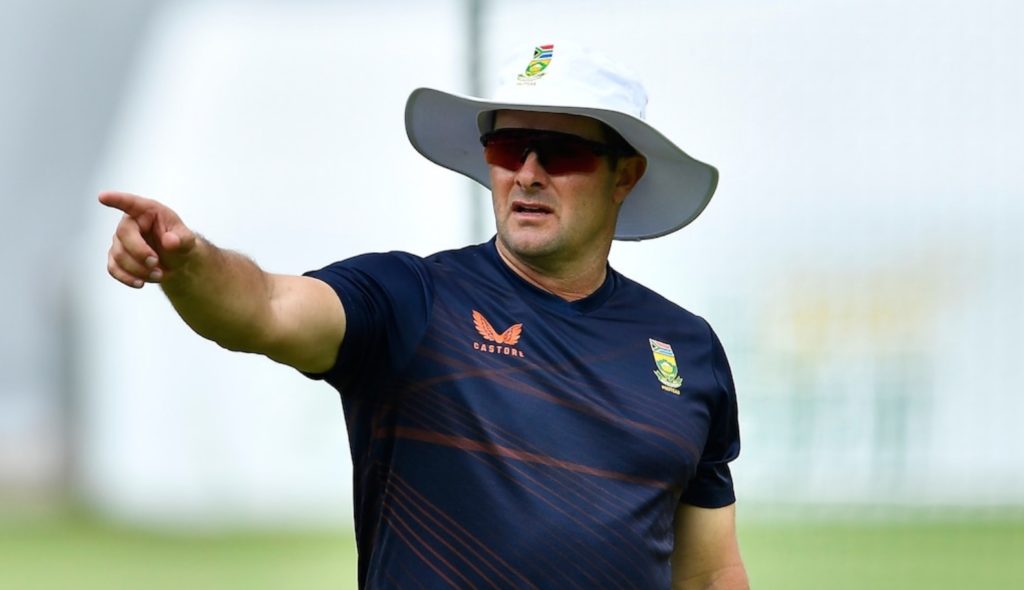Veteran cricket writer COLIN BRYDEN believes Mark Boucher has done nothing to warrant the charges against him and remains an inspired choice as coach of the Proteas.
I have been astonished by what appears to be a witch hunt against Mark Boucher, the national team head coach, which appears to have been endorsed enthusiastically by two writers of this website.
I have expressed my views on the Boucher issue on Twitter and Facebook, eliciting responses from both Ryan Vrede and Mark Keohane, primarily relating to the Paul Adams “brown s**t” testimony at the SJN hearings.
Mr Vrede wrote that my tweets summed up “intellectually bankrupt and privilege-laden sentiment” and then asked how “a middle-aged, white man got to decide” the context of the song sung at team fines meeting.
Mr Keohane wrote in an article which was published on the IOL website: “Bryden is white and part of that established old school privilege that for way too long influenced the narrative of an all-empowering white South African cricket landscape. He belongs in the past, along with everything despicable about South Africa’s exclusively white national selection policy.”
As both writers appear to see no contradiction in the racial profiling of a critic of their anti-racism crusade, perhaps I should expand a little on that profile.
I am indeed white, although “middle-aged” may be a tad flattering and my “privilege” extends only to the colour of my skin. I am old enough to have pre-dated the internet – and to have been writing for more than a decade before television was introduced to this country, a time when the primary job of a sportswriter was to describe an event for the benefit of those who could not be there in person.
I was taught what I believe to be a defining principle of journalism – you can report on what people do or say but you cannot presume to know what they think.
I have written about cricket for more than 50 years, apart from a nine-year spell in a public relations company where I was heavily involved in promoting the Benson & Hedges Series, which introduced floodlights, coloured clothing and music to South African cricket. I also acted as a public relations consultant to the Transvaal Cricket Council and the South African Cricket Union.
I reported extensively on the negotiations which led to South African cricket’s first attempt at unity in 1976 – an exercise undermined by the reality of the country’s apartheid laws and the riots that these led to in the same year – and the talks which led in 1991 to the current administrative situation. In both cases, I got to know and hopefully to understand the viewpoints of the main players in the discussions.
As the cricket writer of the Sunday Times, I travelled the cricket-playing world to report on virtually all the South African team’s campaigns from the historic first tour of India in 1991 until my retirement from the newspaper in 2009. Since then I have continued to report on home international matches for an international agency and I have been editor of the South African Cricket Annual for 27 years. Along with many other South Africans, I have rejoiced in the achievements of an increasingly representative national team and been saddened when they have fallen short of expectations.
Mr Keohane, who I do not recall seeing at any of the many matches I have attended, may be entitled to his view that I belong in the past but I believe I have earned the right to offer a useful perspective.
During the course of more than half a century of observing developments in both the playing and politics of sport one constant has been the importance of leadership. Teams or organisations with strong leadership tend to perform above expectations and the converse is true. South African cricket has been poorly served at administrative level for an unfortunately long time and this has been mirrored in the performances of the national men’s team.
The appointment of Graeme Smith as director of cricket provided a buffer between an inept administration and the players. Smith was a strong captain of the national team and Mark Boucher was one of his chief lieutenants during one of the most successful periods in South African cricket history.
I hold no particular personal brief for Boucher. Although our paths crossed on numerous occasions our relationship never progressed beyond the stage of polite but cursory greetings. I nevertheless respected his skill, competitiveness and what I assumed to be his accumulated knowledge of the technicalities and psychology of playing international cricket.
He served a successful coaching apprenticeship with the Titans and seemed an obvious choice to take charge of the national team, which he did when appointed by Smith shortly before the start of a Test series against England in December 2019.
Enoch Nkwe had been appointed interim team director – effectively the head coach – after the dismissal of Ottis Gibson earlier in 2019. The appointment was part of a structure devised by the then-CEO Thabang Moroe, who was suspended not many months later and eventually fired.
Nkwe had built up a solid record as a coach at franchise level, working with several of the national team players, and had a level four coaching certificate – the highest qualification available – whereas Boucher’s qualifications for the job were earned on cricket fields around the world.
Having effectively been demoted, Nkwe was appointed as Boucher’s assistant with both contracts due to expire after the 2023 World Cup. The metaphorical knives came out for Boucher almost immediately after the appointments, with much being made of Nkwe’s supposedly superior qualifications. In my opinion, no amount of study or certificates can replicate the cricketing nous gained in 147 Test matches and 295 one-day internationals.
It seemed to me that although he may have had to swallow his pride to some extent, Nkwe was being given an opportunity to burnish his credentials and to experience at close quarters the challenges of international cricket, providing a clear pathway to eventually assume the top job. But he resigned last August, reportedly because he felt sidelined.
One of the charges against Boucher is that he failed to formalise any documented roles and responsibilities for Nkwe and “allegedly treated Mr Nkwe in a manner unbecoming of a leader in your position”.
This would point to a failure of management on the part of Boucher although my personal experience of numerous appointments during my career is that I cannot recall ever having been presented with a precise job description. I was, essentially, left to work things out for myself and, hopefully, to make myself useful to whichever organisation had employed me. I cannot pretend to know the exact circumstances of the Boucher-Nkwe relationship, which presumably will be examined in the hearings to come, but I would have thought there was an opportunity for the assistant to make himself indispensable.
And so, eventually, to Paul Adams’ testimony at the SJN hearings. I watched all one hour and 48 minutes of it and was impressed by his articulacy and repeated comments that his revelations should be used primarily to ensure that mistakes of the past should not be repeated and that he hoped the hearings would result in a better structure for cricket.
He gave some examples of racial discrimination or stereotyping that he encountered during his career, including his highly unorthodox bowling action being described as akin “to stealing hubcaps off a moving car”. He blamed the media for this and asked, “Was it because I was born in the Cape Flats. Is it always that Cape Coloureds are referred to as gangsters and thieves?”.
I have tried to find references to this description and it would seem to have originated with the late Eddie Barlow, as quoted in a recent book by Schalk Burger Snr in telling of Barlow’s excitement as head of a cricket academy at encountering an exciting young talent. Barlow deserves great credit for not trying to change Adams’ action, which would probably have had had disastrous effects on his career, but Adams’ discomfort with the description is understandable.
Although it became the headline news in reports on Adams’ testimony and has now apparently become a prime reason for Cricket South Africa calling for Boucher’s dismissal, the adapted Boney M song which referred to Adams as a “brown s**t” was mentioned in a matter-of-fact way by the former player.
The anti-Boucher lobby can find no justification for the label, which in itself is, of course, highly insulting. The context, though, deserves to be examined and I am sure it will be by Boucher’s legal team in the hearings before Advocate Terry Motau.
The song was sung in so-called “fines meetings” after team wins, which by their nature are celebratory and intended to be inclusive. I rather suspect that the majority of board members who are apparently so eager to dismiss Boucher have never been part of such meetings. I have not played sport at top level but I have been involved in fines meetings and still am when I go on golf trips with good friends. Over the course of drinking a few beers we tease each other mercilessly and issue fines for all sort of “offences”, real or imagined. Perhaps it is a “white” thing – I don’t know.
At the time, Adams was the only black player in the team. As stated earlier, I cannot presume to know what the players of the time were thinking in coming up with the song about Adams but I would be truly shocked if the words were intended to be racially derogatory.
In one of my tweets, I referred to a great fuss being made about a “silly song”. It might not have been the most apt description but Twitter does not offer scope for detailed amplification.
In the decades since the song was sung, the South African team has become far more representative and I imagine that the culture has developed accordingly to respect different backgrounds and religions. Fines meetings may well have been phased out, although I hope that players still enjoy an inclusive celebration in the privacy of the dressing room.
What I have seen in recent weeks has been an inspiring unity of purpose in both the Test and one-day international teams, both of which have performed above the obvious levels of talent in their ranks. After an unsuccessful period of experimentation, it seems that the right captains have been appointed in Dean Elgar and Temba Bavuma. It would also seem logical to assume that the coaching staff, led by Boucher, have played a significant role in the development of players who clearly enjoy each other’s company and who display the fighting spirit that was a hallmark of Boucher’s playing career.
Much optimism was expressed when a new board, with a majority of independent directors, was appointed last June. So far, though, the new board has failed to appoint a permanent chief executive, which seems a prerequisite for stable administration. And their most significant action has been to follow up a clearly flawed SJN process with what seems a patently unfair charge sheet against the coach accompanied by what can only be interpreted as a demand that he be fired.
South African cricket deserves better.







